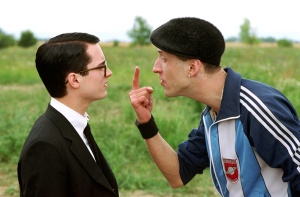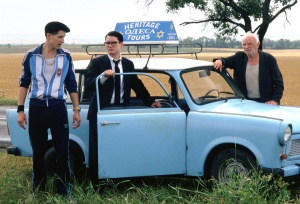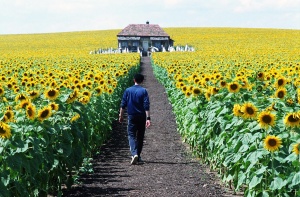Everything Is Illuminated
Everything Is Illuminated, a new movie directed by Liev Schreiber opening September 16th, is a deeply moving and highly engaging film based on a curiously flawed premise. The notion that if we can but understand our past somehow our present will become “illuminated” is a foible particularly prevalent in our troubled times. Jews especially cherish Holocaust studies and Holocaust heritage tours in Eastern Europe as gateways to ethnic identity. It is exactly this pursuit that the film examines. And yet in spite of its questionable thesis the film is a classic road movie, tracing the transformation of its characters as they tumble towards their goal and, presumably, enlightenment.
The plot mirrors the short story “A Very Rigid Search” by Jonathan Safran Foer that appeared in the New Yorker a year before the publication of his acclaimed novel, Everything is Illuminated that earned the 2002 National Jewish Book Award for Fiction. The movie focuses on but one aspect of this kaleidoscopic novel, the hero’s search for a destroyed village Trachimbrod and the woman, Augustine, who saved his grandfather’s life during the Holocaust.
This searcher, as hero, is none other than Jonathan Safran Foer, an eponymous lost soul, obsessed since early childhood with collecting just about everything that could trigger memory and link him to a tangible reality. He inhabits the fractured past as easily as his pensive present. Now he has arrived in the Ukraine, in search of one more thing to buttress his fragile world. Jonathan tells his guide, Alex, that he is “a collector… of things… family things.” His room back home is covered with dozens of meticulously bagged specimens; a clip of hair, an amber encased locust, a discarded ring and a faded photo in an ancient locket that reveals his grandfather as a young man next to a mysterious woman. The back of the photo reads, “Augustine.” The tantalizingly slow and introspective cinematography of Matthew Libatique introduces us to the moody Jonathan, in a haunting performance by Elijah Wood.

His “English language guide” Alex, played by Eugene Hutz, an inspired rocker from the Ukrainian Gypsy Punk band Gogol Bordello, couldn’t be more different than Jonathan. His frantic personality is quickly etched as a wise-guy wannabe Ukrainian rock star imagining his conquests and suave powers in a hilariously fractured English that betrays his illusions and overblown ambitions equally. Nonetheless we empathize with this Ukrainian hustler, expending unlimited amounts of off-the-wall energy in order to serve the needs of what seems to be the sole customer in his family business of Odessa Heritage Tours.
The aforementioned family is headed by a violent father and an equally unpleasant Grandfather (Boris Leskin, a veteran of the Saint Petersburg Theater and numerous American films). Grandfather exclaims that he is sick of the business…”No more dead Jews…” and bitterly expresses his hatred of Jews in Ukrainian diatribes with his grandson, Alex, running like a virulent subtext unbeknownst to Jonathan. Grandfather’s stubborn resentment and Alex’s valiant efforts to find the elusive town of Trachimbrod is played out against the dreamy self-absorption of Jonathan.

The humor and absurdity of this unlikely alliance is an infectious vehicle with which to weave in and out of the tragic past that haunts each of the characters. They are all jammed into a battered jalopy, Jonathan in the back seat with Sammy Davis Jr. Jr., the seeing-eye dog of Grandfather (the driver!), who is delusional enough to imagine that he is blind, each dependent upon Alex and his harebrained translations. Quickly though, the narrative becomes episodic, a lugubrious and overly sensitive series of vignettes that fail to explicate why Jonathan is so determined in his search. What does he hope to accomplish?
Then just when it seems the movie is about to sink into itself we realize that Grandfather is also a searcher, he is also an unlikely pilgrim to Trachimbrod. As he sees the battered photograph of Jonathan’s grandfather and Augustine a light flickers in his eyes and with scant dialogue but canny images the narrative gains force to ply into painful past. We are swept along, aching to know what each of them will discover.
Everything is Illuminated maintains its narrative fascination through a series of magical scenes reminiscent of the Magic Realism of South American author Gabriel Garcia Marquez. While road movies specialize in landscapes as a primary ‘character’ in the story, the use of imagery here is particularly memorable, a deeply aesthetic experience as if memory itself were a physical sensation. As our pilgrims near their goal they come upon a house of a woman who may have known Augustine. It is set in a vast field of sunflowers and as Alex (now fully engaged in the search) strides towards the house it seems to be surrounded by shimmering white angels that morph into a dozen lines of white laundry waving in the afternoon breeze. The effect is mesmerizing.

At the outset of the movie Alex scoffs at the Jews who come looking for their past… “The past is the past…” even though he will nonetheless make “a very rigid search” for their lost relatives, lost villages and lost lives. Later Alex questions Jonathan’s obsessive collecting of objects, even stones and dirt; “Why do you do this?” Jonathan answers, “Maybe sometimes I think I will forget…” Forgetting is a pervasive fear as the present instantly slips into the past, a past that all too easily can vanish. Simply visiting a past, either physically or mentally, cannot repair a fractured present. Only a vision of what the future can and indeed must be can achieve the kind of illumination this movie so beautifully strives for. The beauty of its images and strength of its characters becomes its own kind of truth, illuminating what is ultimately the search for meaning that preoccupies each of us each day as we step into tomorrow.
Everything is Illuminated
Written and directed by Liev Schreiber based on the novel by Jonathan Safran Foer with Elijah Wood, Eugene Hutz, Boris Leskin and Laryssa Lauret
Warner Independent Pictures, approx 102 minutes, rated PG-13
warnerindependentpictures.com